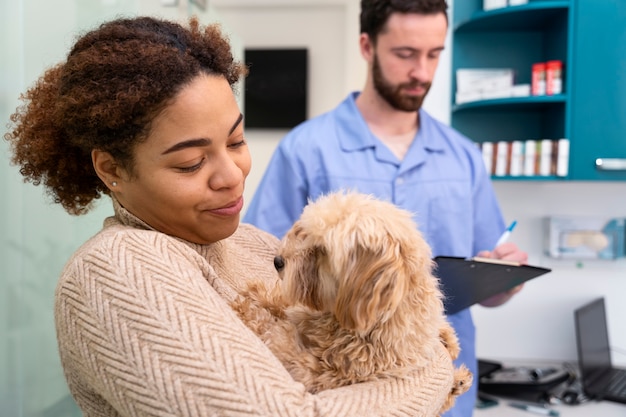5 Common Signs of Stress in Pets & How to Help | PetVet Animal Hospital


5 Signs Your Pet Is Stressed—and What You Can Do About It
Pets, just like people, can experience stress. Whether triggered by environmental changes, loud noises, separation, illness, or unfamiliar guests, stress can take a toll on your pet’s emotional and physical health. At PetVet Animal Hospital in Fishers, Indiana, we often help pet parents identify and manage stress in their animals before it leads to more serious concerns.
Recognizing stress early is key to addressing the root cause and improving your pet’s well-being. Here are five common signs of stress in pets—and how you can support them.
- Changes in Appetite
One of the first signs something might be wrong is a sudden change in eating habits. If your pet suddenly stops eating, eats far less than usual, or begins to overeat, stress could be a factor. Cats are especially sensitive to stress-related appetite loss, which can lead to serious conditions like hepatic lipidosis if left untreated.
What to do: Monitor their food and water intake daily. If the change persists for more than 24–48 hours, it’s time to contact your veterinarian to rule out medical issues and discuss behavior-related causes.
- Excessive Grooming or Shedding
While grooming is normal for cats and even some dogs, excessive licking, chewing, or scratching can be a stress response. Pets under stress may also start shedding more than usual, sometimes in clumps. Over-grooming can result in bald patches or irritated skin.
What to do: If grooming becomes obsessive, provide enrichment and check for sources of anxiety such as boredom, loud noises, or household changes. A veterinary visit is essential to rule out parasites or allergies.
- Hiding or Avoiding Interaction
If your typically social pet starts isolating themselves, hiding under furniture, or avoiding family members, this could be a strong indicator of emotional stress. Cats, in particular, are known to withdraw when feeling threatened or overwhelmed.
What to do: Respect their space, avoid forcing interactions, and create quiet, safe zones in your home where your pet can relax. If the behavior lasts more than a few days, schedule a wellness check to rule out pain or illness.
- Aggression or Sudden Behavior Changes
Stress can cause even the most gentle pets to lash out. Growling, hissing, barking, snapping, or biting can emerge seemingly out of nowhere. These behaviors are often rooted in fear or discomfort rather than true aggression.
What to do: Identify any recent changes—new pets, visitors, loud events—that may have triggered this behavior. Use calm, positive reinforcement and seek professional guidance if aggression escalates. Avoid punishment, which can increase fear and worsen the situation.
- Digestive Upset
Stress often affects the gastrointestinal system. Diarrhea, constipation, or vomiting may appear in otherwise healthy pets when they are emotionally unsettled. Travel, boarding, or household changes can often trigger these symptoms.
What to do: Provide easy-to-digest food, encourage hydration, and monitor for signs of dehydration or blood in the stool. If digestive symptoms persist for more than a day, call your vet to rule out infection, dietary intolerance, or chronic illness.
When to Get Help
Not all stress is avoidable, but chronic stress can negatively impact your pet’s immune system, behavior, and quality of life. If your pet is showing signs of distress, the team at PetVet Animal Hospital is here to help. We offer comprehensive exams, behavioral consultations, and personalized care plans to identify and reduce stressors in your pet’s life.
Supporting your pet emotionally is just as important as meeting their physical needs. By staying attentive to their behaviors and reaching out when something seems off, you can help them feel calm, safe, and secure—no matter what life brings.
Learn more about us and the services we offer by calling (317) 792-8919 or give us a visit at 14065 Mundy Dr,Fishers, IN 46038.



















